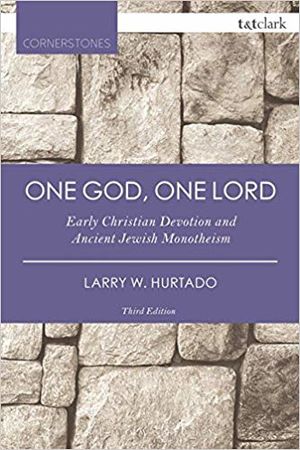One God, One Lord: Early Christian Devotion and Ancient Jewish Monotheism (1988 Hurtado), book
One God, One Lord: Early Christian Devotion and Ancient Jewish Monotheism (1988) is a book by Larry W. Hurtado.
Abstract
In this work on the early development of Christology, Larry Hurtado advances a three-part thesis. First, he asserts that the ancient Jewish religious tradition included the concept of "divine agency," whereby a chief agent figure occupied a principle position next to God. To bolster this claim, he surveys Second Temple Period literature to demonstrate that, within the ancient Jewish tradition, at times personified divine attributes (i.e. Logos, Sophia), or exalted patriarchs (i.e. Enoch, Moses), or principle angels (i.e. Gabriele, Michael) occupied this role. Though these figures were instrumental agents of God, their presence, according to Hurtado, in no way compromised the strict bounds of Jewish monotheism. Second, employing evidence from the canonical gospels and the Pauline corpus, Hurtado suggests that the religious experience of early Christians produced a distinctive mutation of this aspect of ancient Jewish belief. Namely, early Christians began to worship and venerate God's chief agent, Jesus, the risen Lord. Third, he suggests that this binitarian worship of God the Father and of Jesus his son occurred early on in the Jesus movement. Accordingly, rather than situating this development in Christology with the context of Greco-Roman religious pluralism, Hurtado situates Christian binitarian worship squarely within a Jewish-Christian, Palestinian context. An innovative study that had been both heavily critiqued and lauded, Hurtado's ideas continue to stimulate debate today. ~Deborah Forger
Editions and translations
Published in Philadelphia, PA: Fortress Press, 1988.
Table of contents
- Intro
- 1 - Divine agency in ancient Jewish monotheism
- 2 - Personified divine attributes as divine agents
- 3 - Exalted patriarchs as divine agents
- 4 - Principal angels
- 5 - The early Christian mutation
External links
- [ Google Books]
